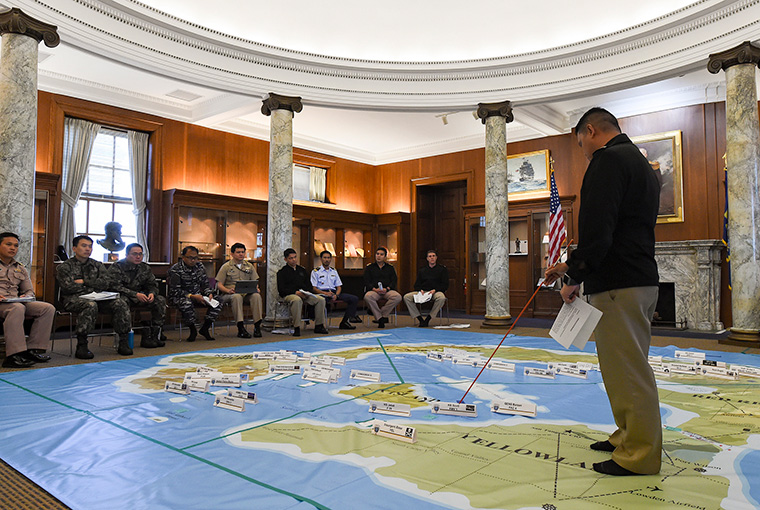Finishing 2018, international maritime staff course hits its stride

About five years ago, some Japanese military officers looked at U.S. Naval War College’s Maritime Staff Operators Course and said: Teach this to us.
At the time, Naval War College was only offering this course – the fine details of operational-level maritime planning -- to American officers bound for a job on a U.S. fleet staff.
After continuing strong interest from other nations, the 12-week International Maritime Staff Operators Course was born in 2017.
As it finishes its second year, the program has graduated 44 military students from 22 nations – including its third class today.
The students represent a wide range of U.S. partners in size and geography, spanning all the inhabited continents.
For these nations – and for the United States – the benefit is the shared understanding that’s being developed. Someday, that knowledge may become crucial when nations are called to work together in a moment of crisis.
“We are forging closer bonds with these countries,” said course director Paul Schmidle, associate professor in the International
Programs Department and the College of Maritime Operational Warfare.
“Probably the biggest thing is, if tomorrow we had to go into action, our graduates would have a much better sense of how to work together and plan together,” he said.
“After 12 weeks, these officers are coming out of here very much being able to plan complex maritime operations.”
Thomas Mangold, dean of the International Programs Department, said the challenge was to take an American course and make it relevant to other navies.
“We had to apply it across the globe. There are always challenges in bringing together international students and developing a curriculum that applies equally among all the navies,” Mangold said. “The lesson was it worked just fine.”
Mangold said it is likely the only naval course of its kind in the world with a genuine focus on interoperability.
Organizers don’t want to increase the class size, but they do want to make more nations aware that it’s available for military officers interested in working on the international stage.
“The best thing in the world to me,” Schmidle said, “would be to hear about a major event out in, let’s say, the Indian Ocean, where the task force commanders had been to this course and were able to integrate and plan a lot better because of it.”
The heart of the curriculum is hands-on training scenarios using historical case studies the allow students to practice operational planning. The Normandy landing during World War II is one example.
“When we actually do the practical, that’s when you can see everything becomes clear,” Schmidle said.
It’s not a holiday for these foreign students. They must leave their families at home and live in bachelor quarters at Naval Base Newport for 12 weeks.
The course work is all in English. Schmidle said he and his staff realized they must be disciplined about how much reading they assign – choosing only the most critical pieces, as the students have the extra challenge of reading in a second language.
However, the foreign officers must be proficient in English before they are accepted, which requires an 80 on a language competency test. The requirement is the same for other international officers attending programs at the Naval War College.
Abdullah Al-Shehri, a commodore in the Royal Saudi Naval Forces, said one of his takeaways is that working as part of a coalition is challenging and complex.
“This course helps us deal with these challenges,” Al-Shehri said. “Relationships take a huge part. If you have a good relationship with people and good contact with them, during the planning and operation, that will help a lot.”
He also learned an unexpected lesson about the importance of realizing cultural differences.
“I come from Saudi Arabia, and we like to talk fast,” he said. “But when I talk to the officers who come from the Far East, they like to talk slow and piece-by-piece. They take their time. ... This is just a small example of how much of a factor is culture.”
For Lt. Arthur Jefferson Layug of the Philippine Navy, this is a chance to learn planning at the coalition level.
“Because in the Philippines, although these planning processes are taught also to us, it’s not as comprehensive,” he said.
In the final weeks of the course, the class works on a fictional modern-day scenario.
In the current session, the story line is that a maritime operation must be executed in the “Kingdom of Yellow,” a failed state where insurgents are amassing and threatening the nearby “Kingdom of Blue.”
Mangold said the curriculum and scenarios will adapt as geopolitics evolve.
“The course will evolve with feedback from students. The case studies will change,” he said. “We study what’s current around us. So as the years go by, we will bring in new information and more examples from the current picture.”
WHAT’S NEXT: The next course is scheduled to begin in March 2019. More information is available at the IMSOC program page.
